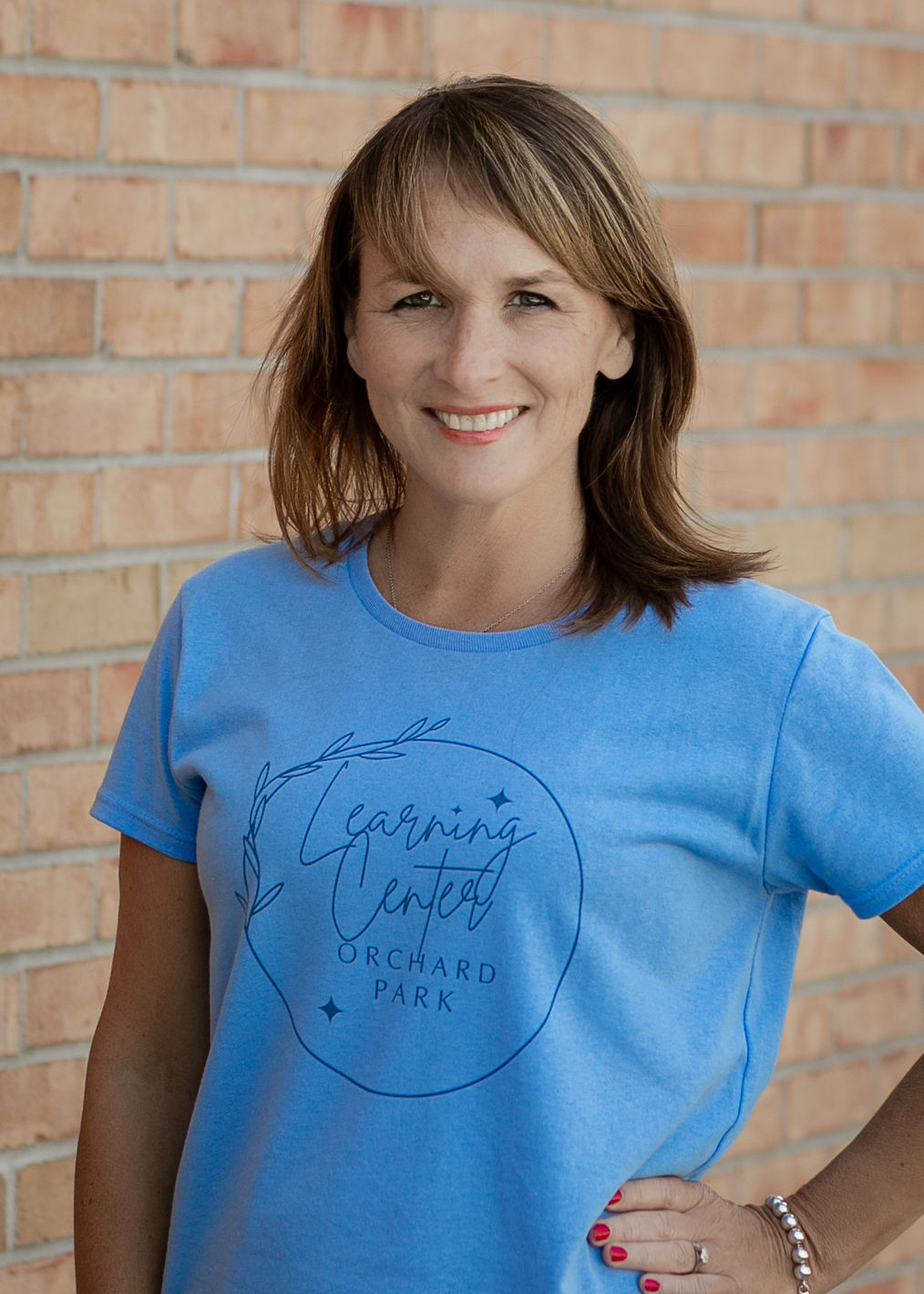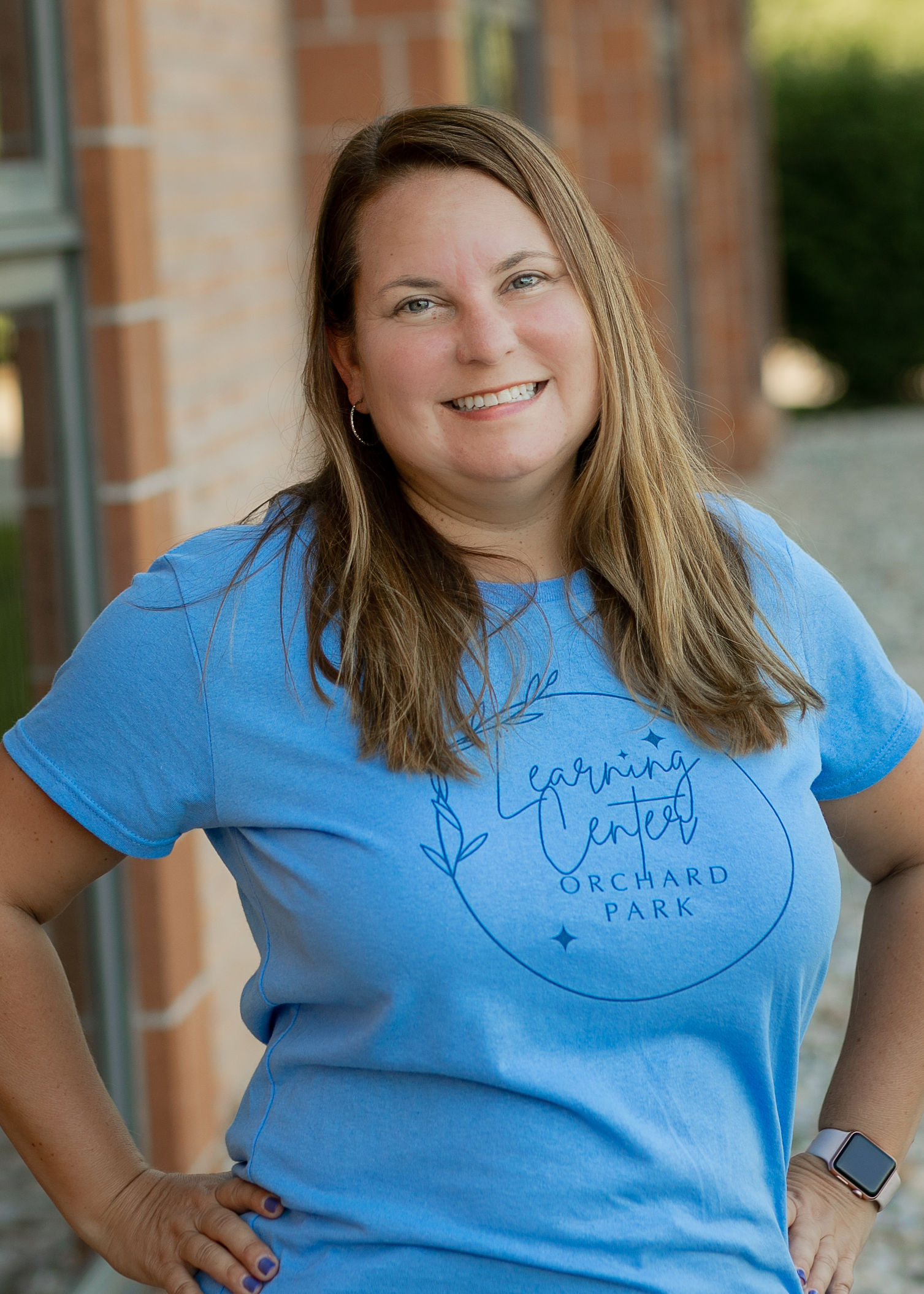Orchard Park Preschool
Committed To Excellence!
An Unlicensed Registered Childcare Ministry.
It is the mission of The Orchard Park Preschool
at Orchard Park Presbyterian Church located in
Carmel, Indiana to stimulate and enhance each
child’s academic and emotional development through
meaningful activities and curriculum, while helping
each child discover the beauty of God’s work,
which makes it a great choice for your preschooler.
Representing Orchard Park Presbyterian Church, the Preschool, has become a pivotal pillar of the surrounding area, serving the children and families of our community.
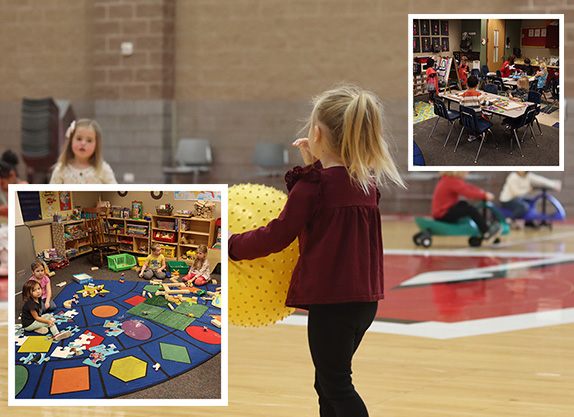
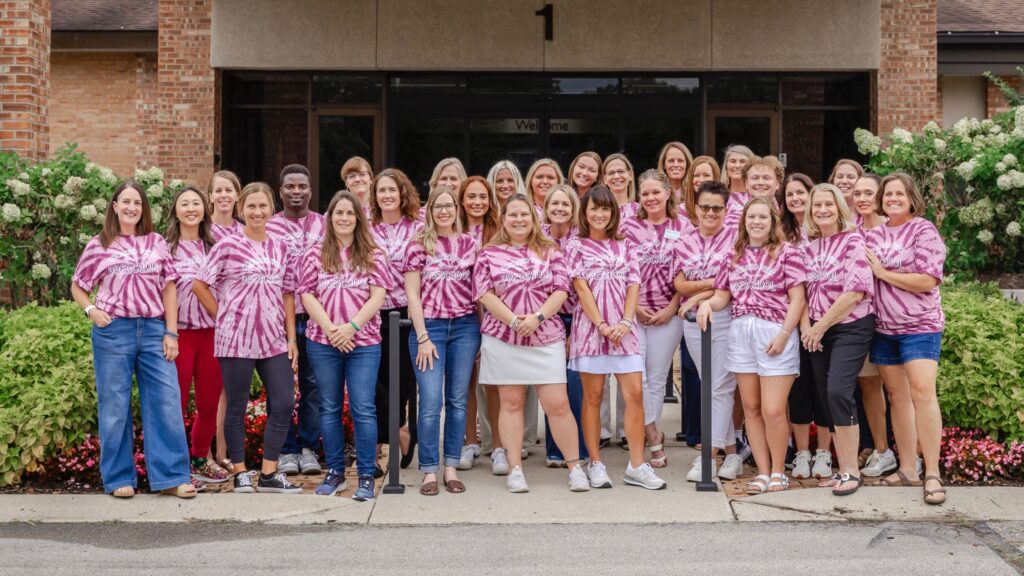
Scroll over the images to learn who we are, our guiding principles, and mission statement.
Who We Are
The Orchard Park Preschool (an unlicensed registered childcare ministry) is a play-based, faith-based preschool that offers care for children from 18 months to 5 years old.
The preschool’s guiding philosophy is that children learn best through play-based learning and discovery.
Our purpose is to provide a secure, loving, and peaceful environment where children of all religious backgrounds and ethnicities are encouraged to awaken their academic potential, develop positive character traits, and acquire basic truths of Christian faith.
As our responsibility, we readily accept, the challenge of helping all children seek answers to their questions, direction for their dreams, and inspiration to grow in God’s love.
Guiding Principles
We believe each child is a unique and special gift from God.
We provide daily bible lessons that give each child a strong Christian foundation.
We believe that children learn best through play and discovery.
We provide curriculum and activities that enhance and stimulate each child’s emotional and academic growth.
Mission Statement
OPP provides a loving and safe environment where children will develop emotionally, spiritually, physically and academically.
REGISTRATION INFORMATION
LITTLE LAMBS
18 MO BY 8/1/2025
Monday and Wednesday
$315 per month
Tuesday and Thursday
$315 per month
Monday, Wed. & Friday
$465 per month
Monday – Friday
$745 per month
TEDDY BEARS/BUSY BEES
2 YEARS BY 8/1/2025
Tuesday and Thursday
$295 per month
Monday, Wed. & Friday
$410 per month
Monday – Friday
$640 per month
JUNIOR PRESCHOOL (MUST BE POTTY TRAINED)
THREE YEARS OLD BY 8/1/2025
Tuesday and Thursday
$265 per month
Monday, Wed. & Friday
$380 per month
Monday – Friday
$600 per month
SENIOR PRESCHOOL
FOUR YEARS OLD BY 8/1/2025
Monday - Thursday
$495 per month
Monday, Tuesday, Thursday, & Friday
$495 per month
Monday – Friday
$560 per month
AFTER SCHOOL CARE: AVAILABLE MONDAY - FRIDAY FROM 2:15 P.M. TO 5:30 P.M.
ALL AGES
MONTHLY FEE
2 days/week
$200 per month
3 days/week
$300 per month
4 days/week
$400 per month
5 days/week
$500 per month
Lets learn more about Orchard Park Preschool.
Directors of the Orchard Park Preschool:
Emily Ward and Jen Witherbee
Email:
preschool@orchardpark.org
Phone number(s):
Preschool Main Line: (317) 814-2488
Preschool Second Line & Attendance: (317) 814-2488
From Main Phone Number: (317) 844-1107 ext. 110 or 111
Address:
1605 E 106th St. Indianapolis, IN 46280
The preschool is a Christian preschool which provides spiritual, social, emotional, physical, and cognitive opportunities. Our play-based philosophy involves both child-initiated and teacher-supported learning for our students. Simultaneously, our Christian emphasis is ingrained in our routines each day, beginning with praying for the safety of our students, guidance from our teachers, and personal requests for our families during our daily staff chapel.
The legacy of the preschool program, throughout our more than 40 years in the community, has allowed us the opportunity to offer five classes, ranging from 18+ months old to 5+ years old. Our class options, from twice-a-week to five-days-a-week programs (9:00 a.m. – 2:15 p.m.), were developed to meet the wide variety of needs in our growing community. In addition, we are looking forward to adding before and after-school care, which will allow our families more flexibility in their scheduling needs.
All of our students are receiving our inclusive curriculum, developed collaboratively by our team of teachers, in order to provide each child a nurturing and enriching experience. In this way, both our younger students and older students are working on the same concept, but at differentiated levels based on their developmental age. One of our main concepts is the “Handwriting without Tears” learning approach, which starts with hand strengthening, correct pencil grip, “scribbling”, and writing exercises until they are writing both uppercase and lowercase letters proficiently. This process meets each child where they are developmentally and builds their knowledge and confidence each year until they are ready to enter kindergarten with confidence.
Throughout our more than 40 years in the community, The preschool’s tradition has allowed us many opportunities:
- focus on promoting: each child’s sense of self-worth by teaching self-sufficiency within their age and skill level
- creating and sustaining relationships with others by learning social skills, reinforcement of moral values taught at home
- beginning and/or continuing a relationship with God, the recognition and expression of his/her emotions in relation to others, physical activity to encourage good health, and play-based learning experiences
- to create a positive and successful start to their academic career.
Our amazing staff, would be honored for you to join our Preschool family, where our doors are open to all of God’s children.
Sincerely,
The directors of Orchard Park Preschool and staff.
The Orchard Park Preschool hours are 9:00 a.m. to 2:15 p.m.
If your student is signed up for after care, after care hours are from 2:15 p.m. to 5:00 p.m.
If your student is currently enrolled in Orchard Park Preschool, or you are a parent / caregiver and would like more information, or you are looking to enroll:
click here.
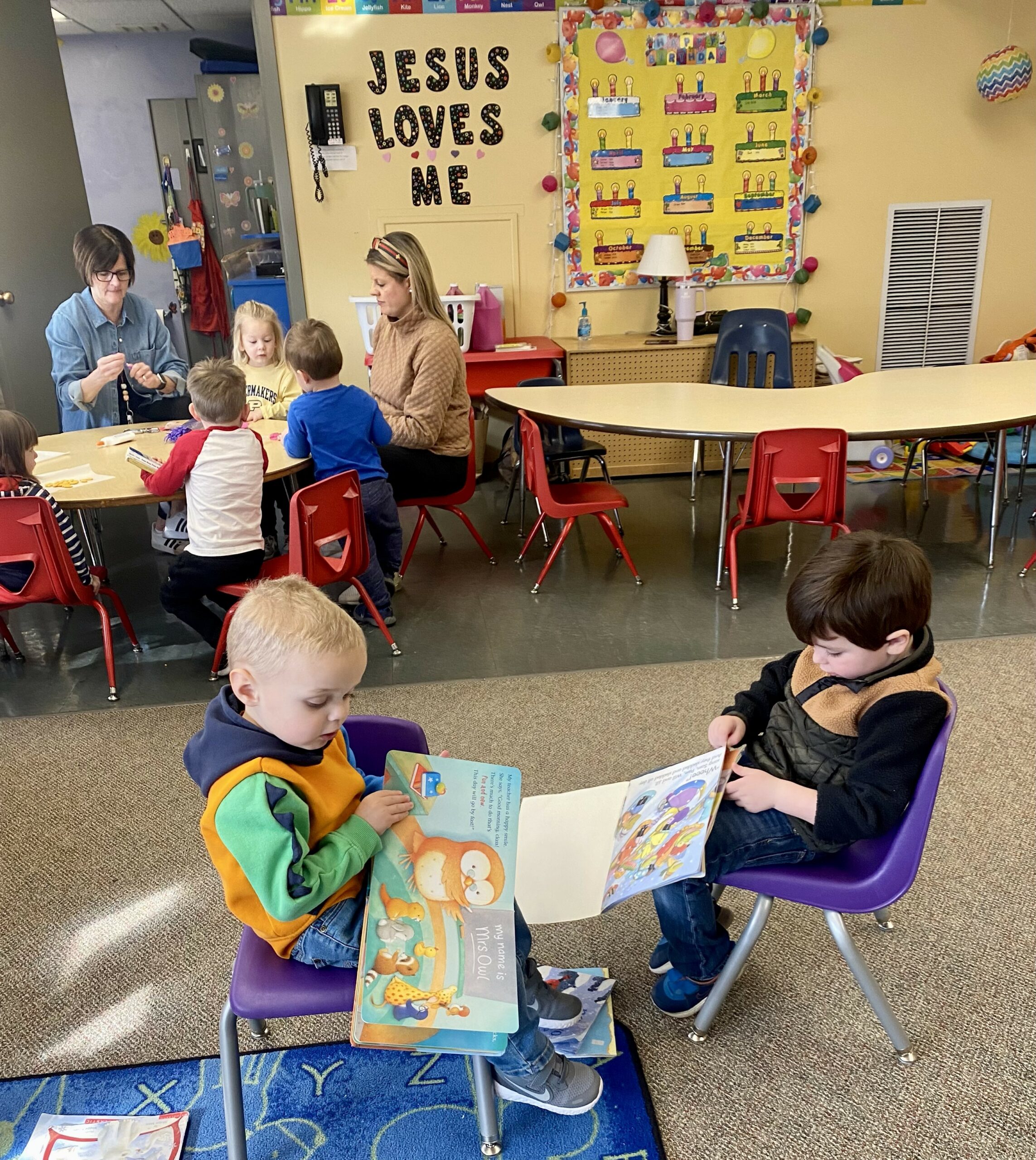
Click on the program to learn more!
The OPPC Preschool in Carmel, Indiana offers a variety of programs to help students succeed in school and life. Our programs are designed to meet the needs of each individual student, and our experienced staff is here to help every step of the way.
Our academic programs include art, music, and play based learning. Our goal is to provide a well-rounded education that will help our students excel in all areas of their lives.
- After Care Program (2:15pm to 5:30pm)
- Little Lambs Program (18 months of age)
- Teddy Bear Program (2 years of age)
- Jr. Preschool Program (3 years of age)
- Senior Preschool Program (4 years of age)
We are offering a after preschool care program. All age groups would be
combined and care would be available from 2:15 p.m. to 5:30 p.m.
If you are registering for classes please express your interest on the registration form.
We have a daily Bible lesson, we sing lots of songs, we learn about the love of God, and we spend lots of time outside (weather permitting). We are learning how to crawl, walk and climb. The students are given many opportunities for indoor and outdoor playing including: grabbing of items, crawling, walking, climbing, stacking of blocks, play with a wide variety of materials to work with to give our students the opportunities for imaginative play.
Listed below are developmental milestones that we will be helping your child attain while at our Preschool in the Littles Lambs Program.
Interacting: Social and Emotional Development. Your child will:
– become anxious when separated from parents/caregiver.
– look at who is speaking to them.
– demonstrate a wariness of strangers.
– avoid some danger and take fewer risks.
– comfort others who are hurt or sad.
– imitate others and act out actions.
– recognize themselves in a mirror or photos.
– create imaginative games and pretend toys are alive.
– express anger and/or temper when frustrated.
– cooperate, take turns, and share, but may compete for toys.
– show interest in doing things independently.
– play alongside others (parallel play) with brief interactions.
– seek attention, show need of approval, and an awareness of disapproval.
Talking: Communication and Language Development. Your child will:
– speak in 2-3 word sentences, but strangers may not understand.
– repeat words heard in conversations.
– say words “me” and “mine”.
– use “hi”, “bye,” and “please” with reminders.
– ask for mother, father, and/or caregiver.
– communicate own name and age.
– make animal sounds, such as “moo.”
– complete sentences and rhymes in familiar books.
– ask for information about an object.
– verbally begin to express desires and feelings.
Moving: Physical or Motor Development Motor Skills. Your child will:
– balance while picking up items, walk without help, and take steps backwards.
– walk up steps with help.
– jump awkwardly and run stiffly with their eyes on the ground.
– toss a ball and be learning to kick and catch.
– climb on and off furniture without help.
– open cabinets or drawers.
– stack blocks (4 or more).
– completes simple puzzles (2-4 pieces).
– successfully complete some dressing and self-care (remove hat, mittens, and socks) and be attempting others (pull up/down pants, brush hair, brush teeth, etc.).
– wash hands.
– feed themselves with a spoon and drink with a straw.
– draw scribbles with crayon or pencil.
– be developing a dominant hand (left/right).
Thinking: Cognitive Development Your child will:
– begin to navigate environment on their own.
– follow single step instructions.
– begin to identify basic colors and shapes.
– match items, like putting a round lid on a round pot.
– enjoy taking items apart.
– count to 3 objects.
– identify and point to parts on a doll when asked.
– solve problems by trial and error.
– search for items that are out of sight.
– substitute objects in pretend play (ex: Using a block as a person).
– recognize some humor and laugh at things or events.
– identify items in picture books by pointing to them.
We have cultivated an educational environment and curriculum to reflect the ever-changing activities of our young learners. We will begin working on potty training as soon as families and children are ready.
We have a daily Bible lesson, we sing lots of songs, we learn about the love of God, and we spend lots of time outside (weather permitting). We are learning how to share, how to take turns, and many other social/emotional skills. We believe children learn through play, so there is lots of playing and learning.
Listed below are developmental milestones that we will be helping your child attain while at our Preschool in the Littles Program.
Interacting: Social and Emotional Development, Your child will:
– demonstrate wanting to be helpful.
– change behavior based on setting (library verses playground).
– avoid some danger and take fewer risks.
– comfort others who are hurt or sad.
– separate easily from caregiver.
– help clean up toys and messes at home/school.
– act out elaborate events to tell a story and play “dress-up”.
– prefer to play with other children verses playing alone.
– express likes and dislikes with an interest in trying new things.
– cooperate in play with other children.
– change the rules as they go along.
-pretend to play with imaginary objects.
-negotiate solutions to conflicts.
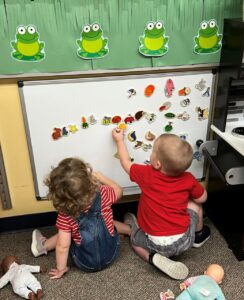
Talking: Communication and Language Development , Your child will:
– speak in 3-5 word sentences, but strangers may not understand.
– say words “I”, “you”, “me”, and “we” and use some plurals.
– understand some spatial concepts like “in” or “on”.
– know descriptive words like “big” or “happy”.
– use “please” and “thank you”.
– refer to self by own name, list friends, and name 10 or more familiar objects.
– communicate own name and age and will list friend(s).
– sing or repeat simple rhymes or lyrics.
– enjoy being read books and retell a story.
– have fun with language and recognizes absurdities (You packed a whole restaurant in your lunchbox!)
– ask “why”, “what”, “when”, “where”, and “how” questions.
– express feelings, attempt humor, and demonstrate shame.
– ask to use to toilet.
– imitate housework or help with simple tasks.
Moving: Physical or Motor Development Motor Skills
Your child will:
– jump with both feet and may hop on one foot.
– throw a ball overhead and try to catch it.
– pedal tricycle and kick a ball.
– balance on one foot (1 second).
– walk upstairs using alternating feet, walk in a line, and walk on tiptoes.
– open doors independently.
– construct a tower of blocks (6 or more).
– complete a puzzle of 3-4 pieces.
– dress and undress themselves (except for buttons and laces).
– wash and dry their hands.
– use toilet paper (with help).
– feed themselves with a spoon and hold a cup in one hand.
– draw wavy lines across the page or might make letter like marks with a crayon or pencil.
– start copying vertical/horizontal lines and circles.
– fold paper.
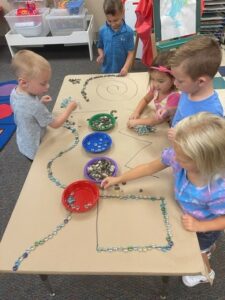
Thinking: Cognitive Development
Your child will:
– begin to recognize sounds in their environment.
– follow instructions with one or two steps.
– identify basic colors and shapes.
– match items by basic shape or primary color.
– know some numbers.
– count 2-3 or more objects.
– recall what happened yesterday.
– sustain attention for about 3 minutes.
– understand time concept words like “now”, “soon”, and “later”.
– identify what is food and not food.
– know where items belong.
– substitute objects in pretend play (ex: Using a block as a person).– recognize some humor and laugh at silly ideas.
– look through a book alone turning one page at a time.
We have designed our learning environment and curriculum for the three-year-old’s to continue building on their self-help skills and beginning preschool skills.
Using different approaches to education helps children develop individual senses of independence and creativity. Students develop math and reasoning skills through patterning, object sorting, measurement, graphing, and numeral identification.
Literacy and language skills are developed through stories, music, and prewriting exercises. Three-year old’s will continue to increase their motor skills through art activities, use of various writing utensils, and use of scissors.
Students will be able to express their emotions through music, movement, visual arts, and dance. Your child will gain further respect for diversity, family, and community. With exposure to nature and science children will develop their abilities to make predictions, to observe, and to generalize data through experimentation and investigation.
This program will expose your child to STEAM activities! STEAM stands for Science, Technology, Engineering, Art and Mathematics.
Listed below are developmental milestones that we will be helping your child attain while at our Preschool in the Jr. Preschool Program.
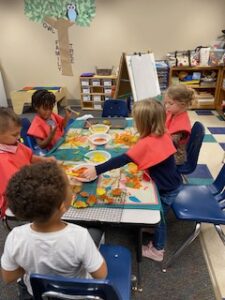
Interacting: Social and Emotional Development, Your child will:
– demonstrate wanting to be helpful.
– change behavior based on setting (library verses playground).
– avoid some danger and take fewer risks.
– comfort others who are hurt or sad.
– separate easily from caregiver.
– help clean up toys and messes at home/school.
– act out elaborate events to tell a story and play “dress-up”.
– prefer to play with other children verses playing alone.
– express likes and dislikes with an interest in trying new things.
– cooperate in play with other children.
– change the rules as they go along.
– pretend to play with imaginary objects.
– negotiate solutions to conflicts.
Talking: Communication and Language Development, Your child will:
– speak in 3-5 word sentences, but strangers may not understand.
– say words “I”, “you”, “me”, and “we” and use some plurals.
– understand some spatial concepts like “in” or “on”.
– know descriptive words like “big” or “happy”.
– use “please” and “thank you”.
– refer to self by own name, list friends, and name 10 or more familiar objects.
– communicate own name and age and will list friend(s).
– sing or repeat simple rhymes or lyrics.
– enjoy being read books and retell a story.
– have fun with language and recognizes absurdities (You packed a whole restaurant in your lunchbox!)
– ask “why”, “what”, “when”, “where”, and “how” questions.
– express feelings, attempt humor, and demonstrate shame.
– ask to use to toilet.
– imitate housework or help with simple tasks.
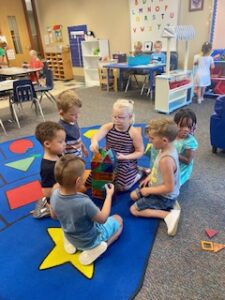
Moving: Physical or Motor Development Motor Skills, Your child will:
– jump with both feet and may hop on one foot.
– throw a ball overhead and try to catch it.
– pedal tricycle and kick a ball.
– balance on one foot (1 second).
– walk upstairs using alternating feet, walk in a line, and walk on tiptoes.
– open doors independently.
– construct a tower of blocks (6 or more).
– complete a puzzle of 3-4 pieces.
– dress and undress themselves (except for buttons and laces).
– wash and dry their hands.
– use toilet paper (with help).
– feed themselves with a spoon and hold a cup in one hand.
– draw wavy lines across the page or might make letter like marks with a crayon or pencil.
– start copying vertical/horizontal lines and circles.
– fold paper.
Thinking: Cognitive Development, Your child will:
– begin to recognize sounds in their environment.
– follow instructions with one or two steps.
– identify basic colors and shapes.
– match items by basic shape or primary color.
– know some numbers.
– count 2-3 or more objects.
– recall what happened yesterday.
– sustain attention for about 3 minutes.
– understand time concept words like “now”, “soon”, and “later”.
– identify what is food and not food.
– know where items belong.
– substitute objects in pretend play (ex: Using a block as a person).
– recognize some humor and laugh at silly ideas.
– look through a book alone turning one page at a time.
We have set up our Carmel, Indiana, preschool to help preschoolers to develop socially, and emotionally so that collaboration, fun, and friendships can happen!
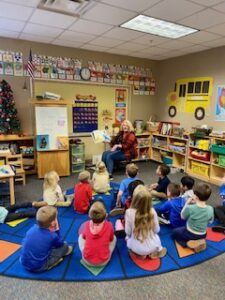
Students will enhance their resourcefulness by learning how to utilize materials in different ways. Furthermore, they’ll gain early planning skills.
Developing logic and reasoning skills are supported through dramatic play, drawing figures, and shapes to convey meaning, helping children to develop symbolic thinking skills. Our approach to literacy and language will support students in developing alphabet knowledge, writing skills, and letter sounds.
Children will learn to respond appropriately to questions about books and find solutions to simple problems. We will work on using emotional words (such as I am mad) to have needs met while following established rules and routines in the classroom.
You will see the creative arts in this program being displayed through music, movement, and the visual arts. Several artist studies will be done in this program.
Math skills included will help children learn about identifying numerals and altering patterns, we round off this program with studies of nature and science helping to develop analytical skills such as classifying objects into living and non-living, providing explanations for why an event/outcome occurred, and demonstrating persistence and creativity in problem-solving.
Listed below are developmental milestones that we will be helping your child attain while at our Preschool in the Senior Preschool Program.
Interacting: Social and Emotional Development, Your child will:
– demonstrate wanting to be helpful.
– change their behavior based on their setting (library verses playground).
– avoid danger and will take fewer risks.
– comfort others who are hurt or sad.
– separate easily from caregiver.
– help clean up toys and messes at home/school.
– act out elaborate events to tell a story and play “dress-up”.
– prefer to play with other children verses playing alone.
– express likes and dislikes with an interest in trying new things.
– cooperate in play with other children.
– change the rules as they go along.
– pretend to play with imaginary objects.
– negotiate solutions to conflicts.
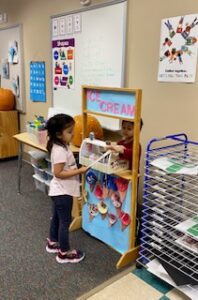
Talking: Communication and Language Development, Your child will:
– speak clearly in full sentences, but makes mistakes in pronouncing long, difficult, or complex words.
– be able to communicate where strangers understand much of what is said.
– use most speech sounds, but may distort more difficult sounds (l, r, s, sh, ch, y, v, z, th).
– use “a,” “an” and “the” when speaking.
– use past-tense verbs and verbs ending in “ing”.
– sing a songs or rhymes from memory.
– tell stories, recall parts of stories, and explain actions.
– describe a simple experience and the use or function of objects (fork, car, hat, etc).
– have fun with language and recognizes absurdities (You packed a whole restaurant in your lunchbox!)
– ask direct questions to gain information.
– verbally express ideas and feelings.
Moving: Physical or Motor Development, Your child will:
– try to skip and gallop.
– catch a bouncing ball most of the time.
– be able to walk backwards or balance on one foot.
– walk downstairs using alternating feet.
– swing by themselves and keep momentum.
– pour liquid from a small pitcher or cup.
– construct a tower of blocks (7-9 blocks).
– complete a simple puzzle of 4-12 pieces.
– dress themselves (tries buttons and buckles).
– complete self-care tasks (use toilet alone, brush teeth with help, attempt utensils to feed self, etc.)
– try to write their name using correct pencil grip.
– draw with their arm rather than small hand movements.
– create a circle with a pencil or crayon.
– use blunt scissors to try to cut.
– develop preference for hand dominance (left/right).
– form letters accurately.
– draw a person or self with two to four body parts.
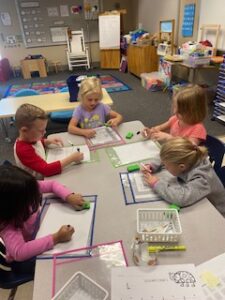
Thinking: Cognitive Development, Your child will:
– begin to understand the concept of time.
– follow instructions with two or three steps.
– identify primary colors and shapes.
– categorize items by basic shape or primary color.
– count 5 or more objects.
– correctly identify body parts.
– play simple board games or card games.
– understand directional words like: “big”, “little”, “tall”, and “short”.
– understand how to take turns without always needing reminders.
– recognize when things are the “same” or “different”.
– begin to distinguish between real and imaginary.
– desire to know what happens next in a sequence or story.
– identify situations that illicit emotions of happiness, sadness, or anger.
Ready to learn!
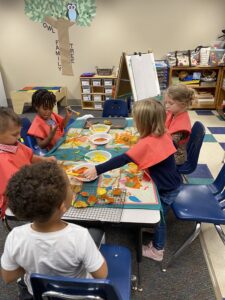
The Orchard Park Preschool is accepting enrollment for the 2024/2025 School Year. All fees are current.
Click the registration form if you would like to start the process to register your child.
Return Registration forms to Orchard Park Preschool, 1605 E106th St. Indianapolis, IN 46280. If you have any questions please call 317.814.2488 or email preschool@orchardpark.org.
Find the appropriate age group for your child in the following list. If you have questions about which group your child should attend, don’t hesitate to get in touch with our preschool staff at preschool@orchardpark.org, by phone at 317.814.2488, and extension 111 on our main line.
Lets learn why early childhood education is important.
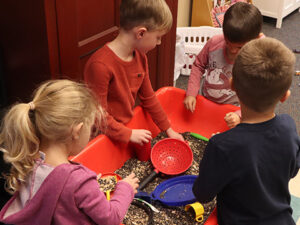
Preschool education is important for your child for many reasons. It provides your child with a foundation upon which to build future academic success. In addition, early childhood education can help your child develop important social and emotional skills before kindergarten. For example, your child will learn how to share, take turns, and resolve conflicts.
Preschool helps your child learn how to interact with other children, follow rules, practice motor skills, and progress in achieving additional developmental goals.
These skills are not only important for kindergarten but they are vital to your child’s future. Preschool education can help your child develop a love of learning that will last a lifetime. Investing in preschool that values early childhood education for your child is one of the best decisions you can make.
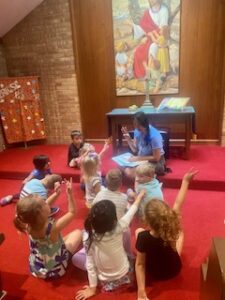
A faith-based early learning program can provide children with a foundation of religious values and teachings. Such programs can help them develop a strong sense of personal identity before kindergarten.
Early childhood learning programs can prepare kids with a sense of community and belonging. These schools typically offer a more structured environment than secular programs which can benefit some children.
A faith-based learning program can provide many benefits to children before they attend elementary school.
Meet your Orchard Park Preschool
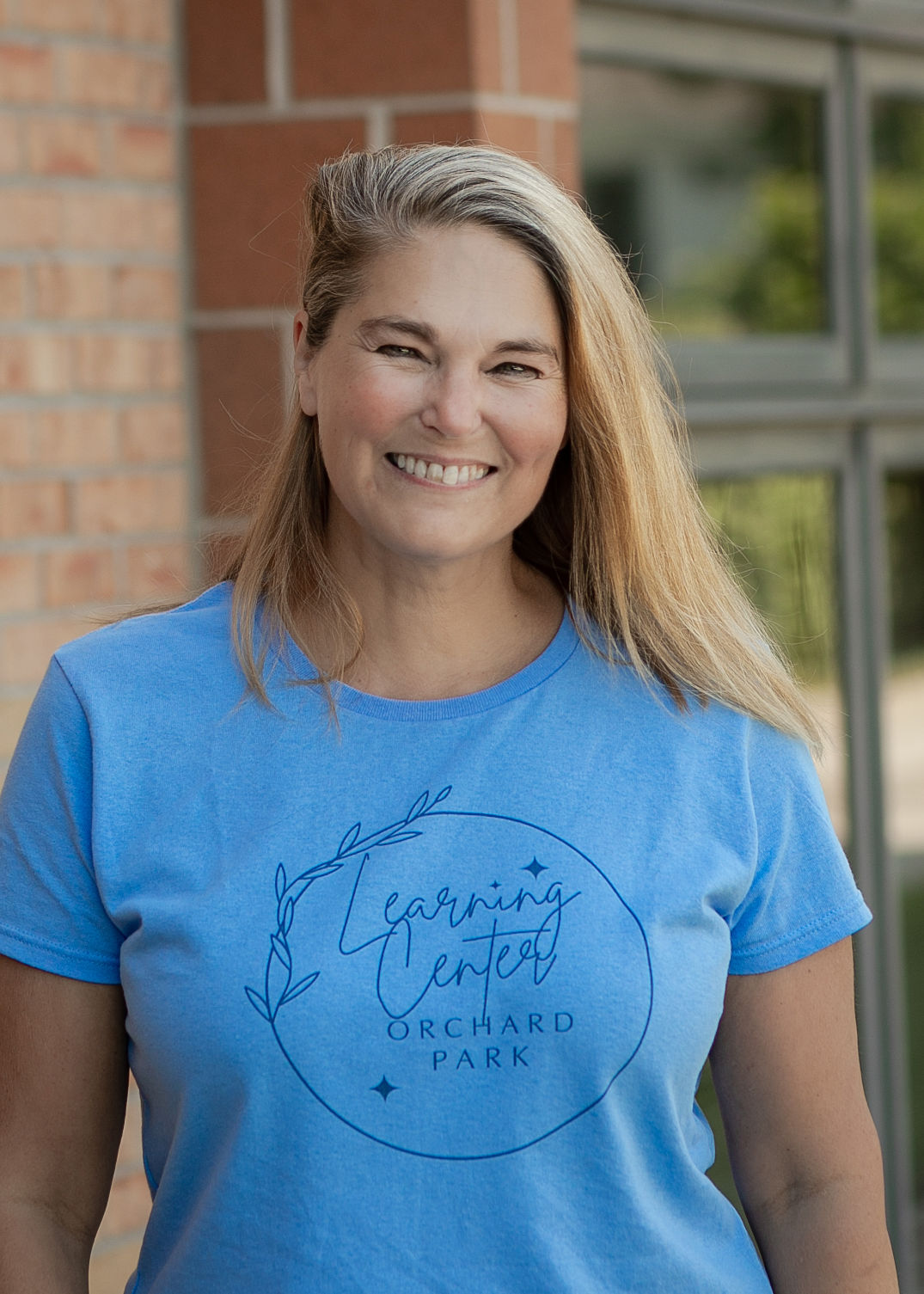
Adley Walschlager
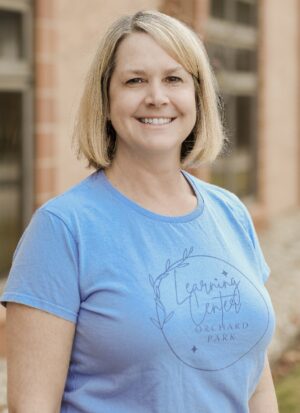
Shane Hadley
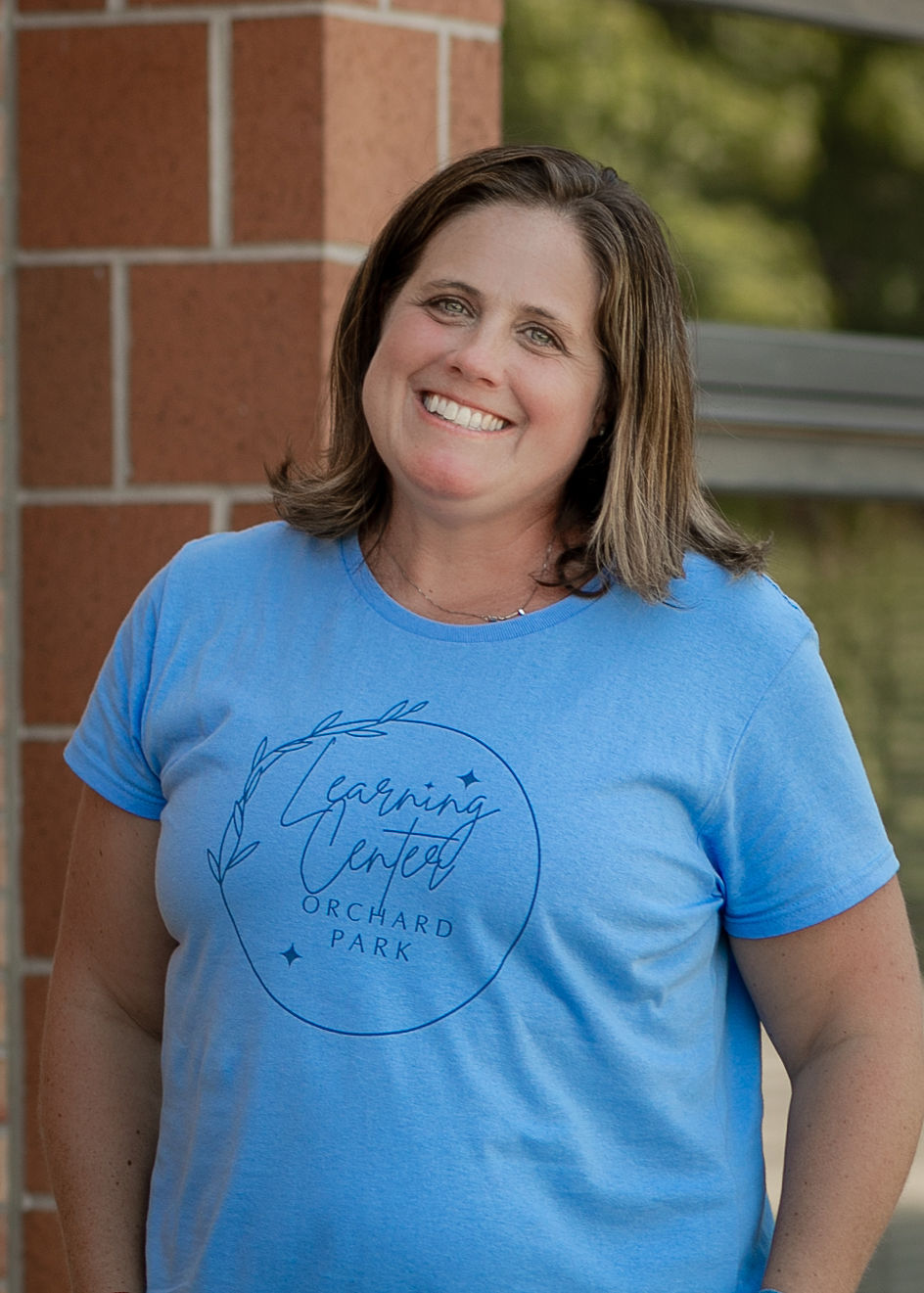
Becky Meek
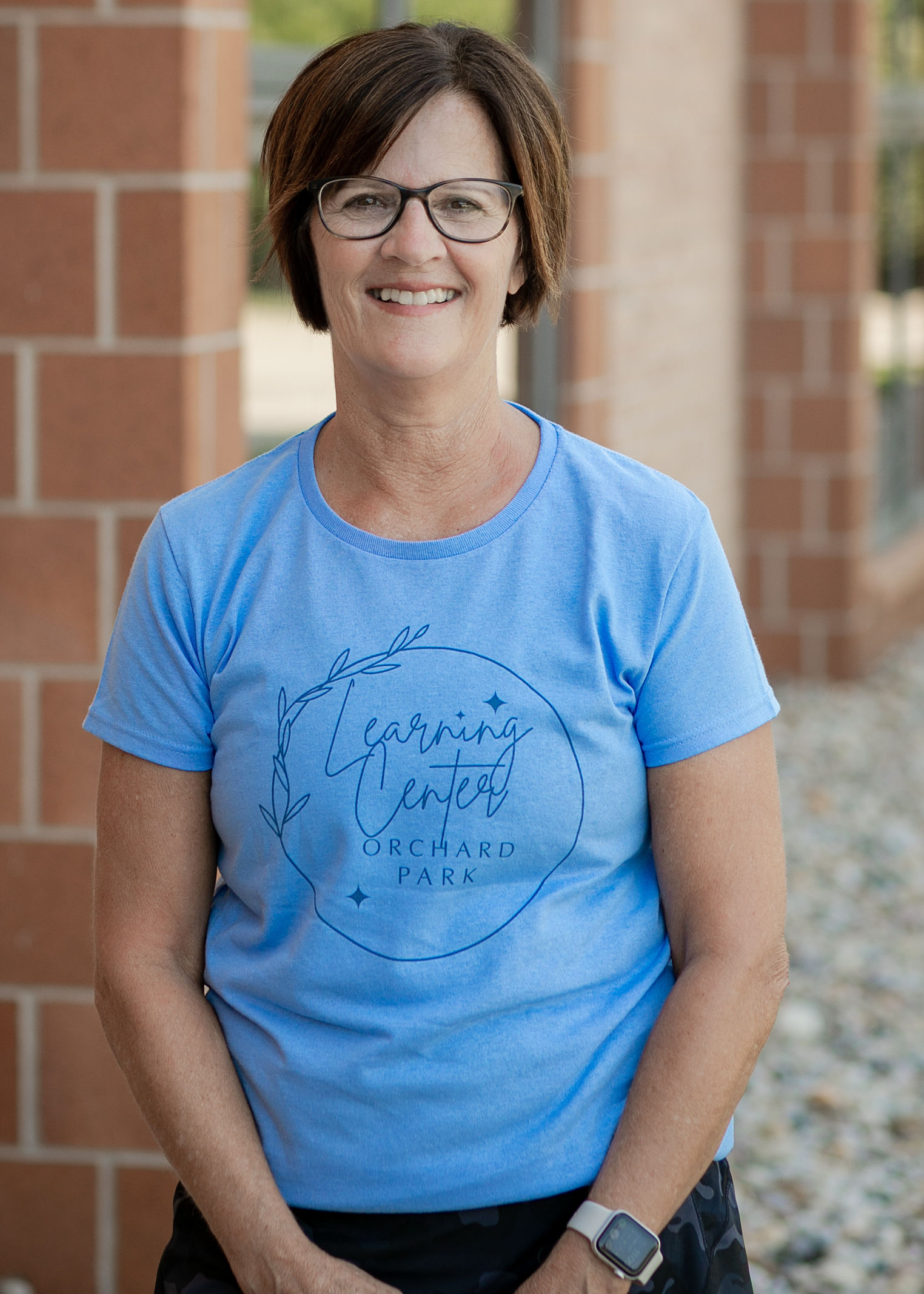
Charlene Trent
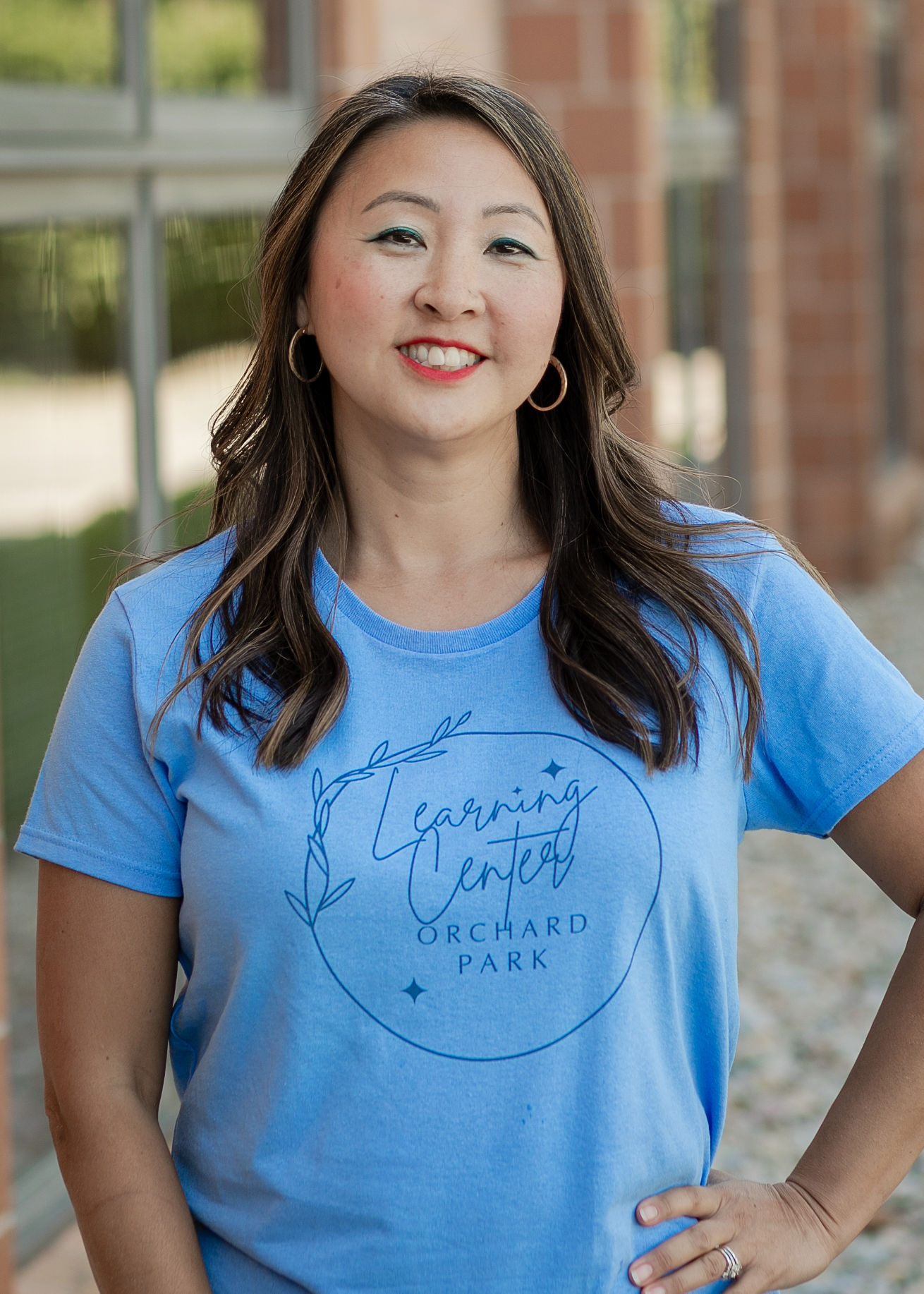
Deidre Bias
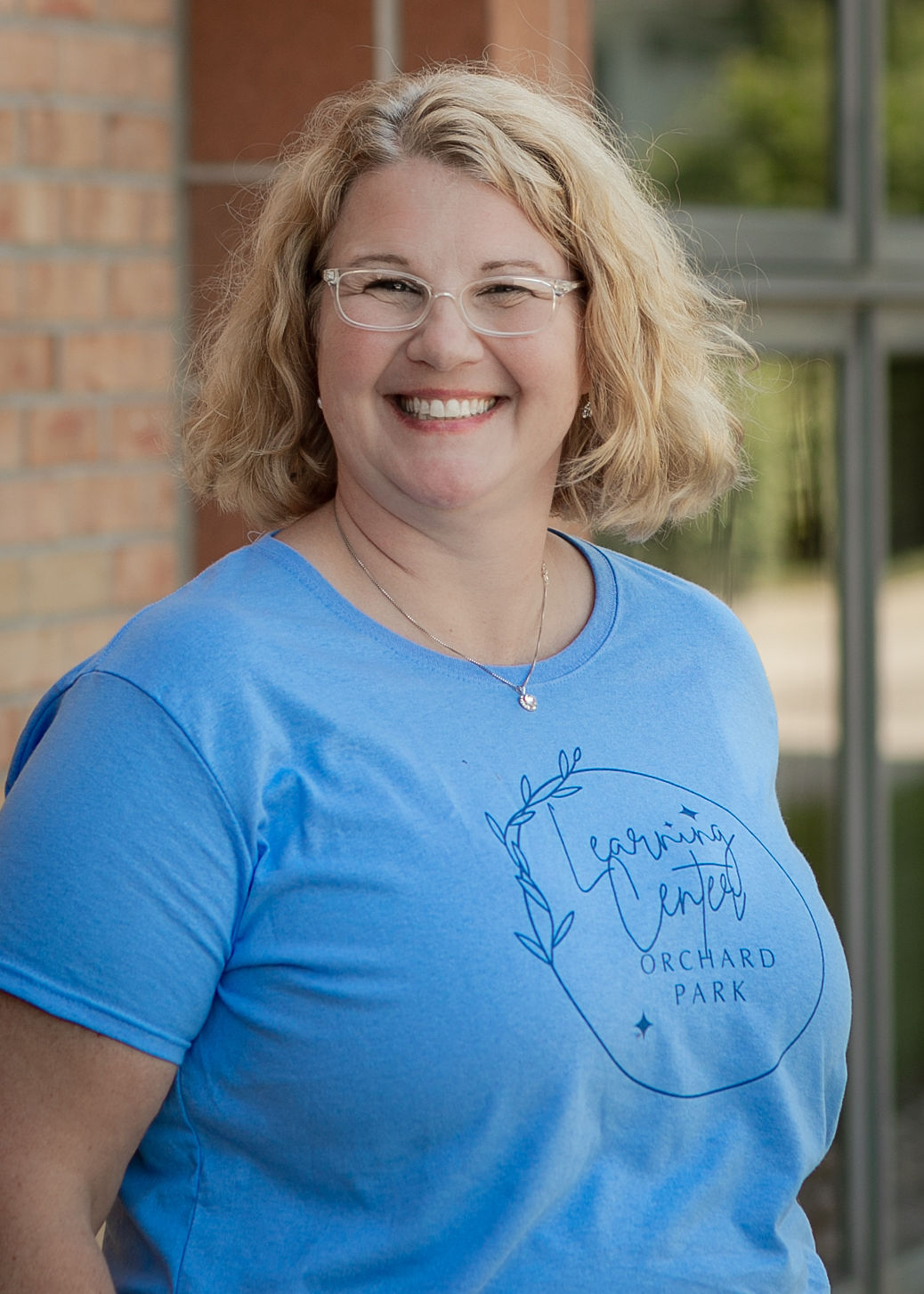
Susie Feuerstine
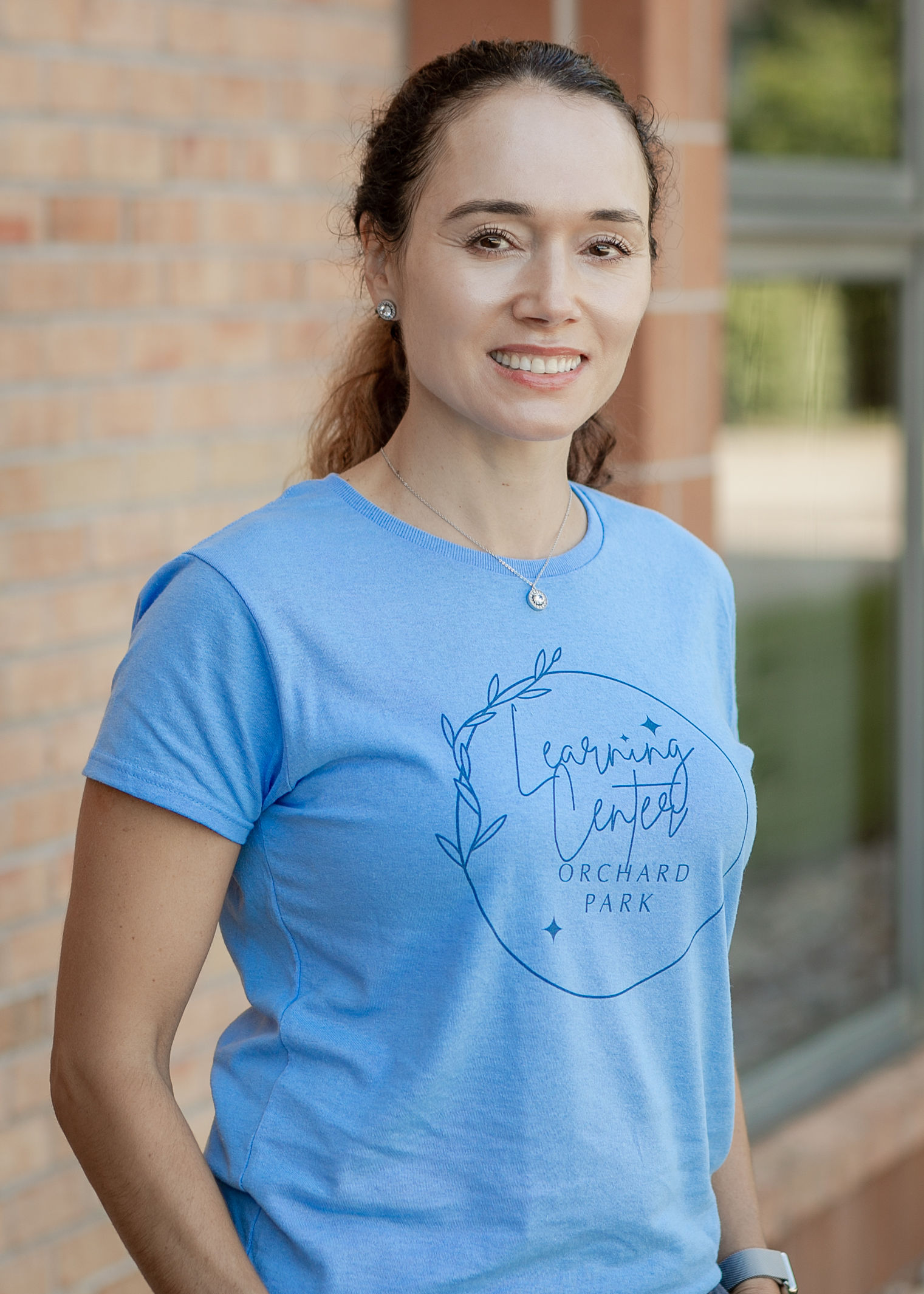
Nina Haig
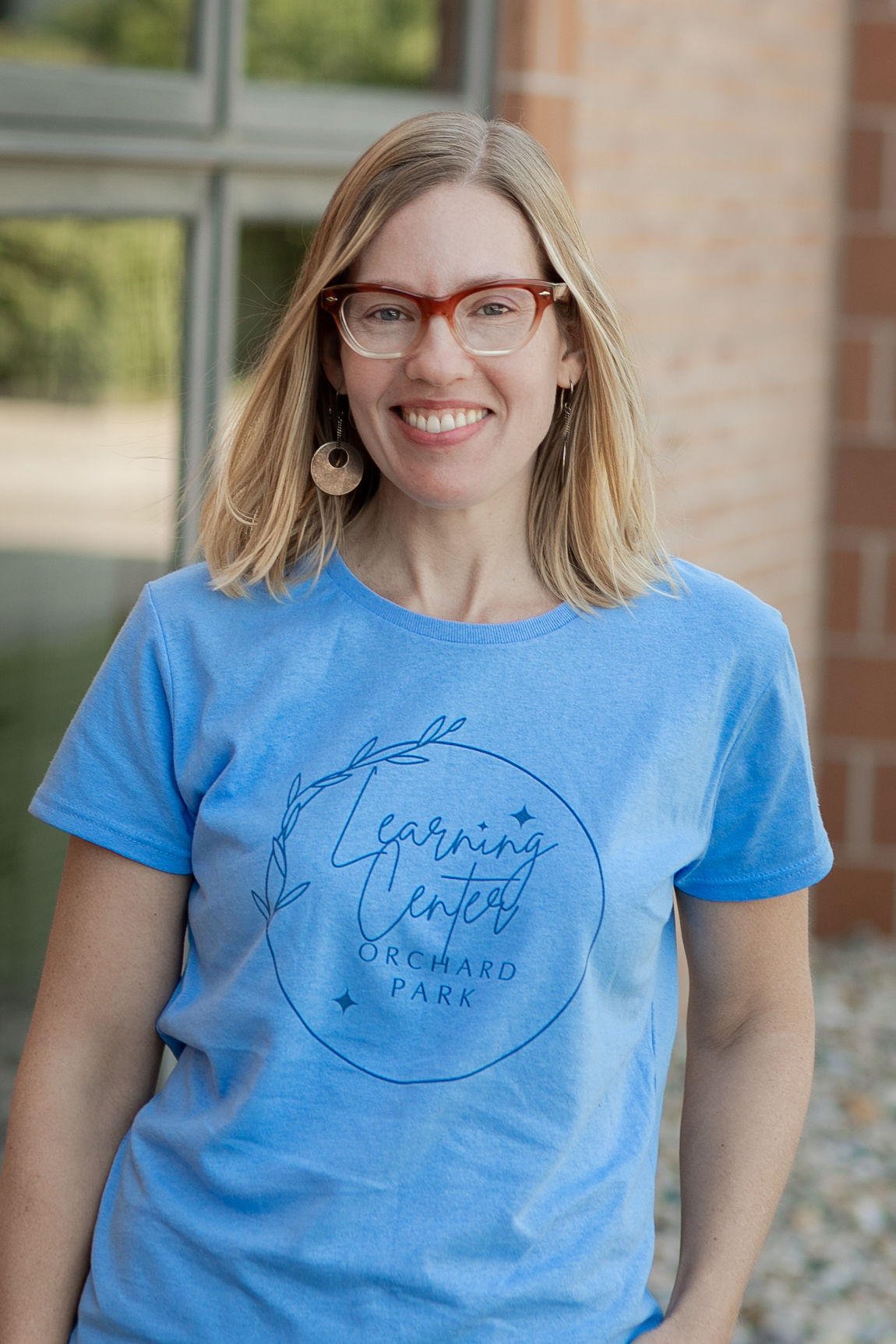
Larissa Muellner
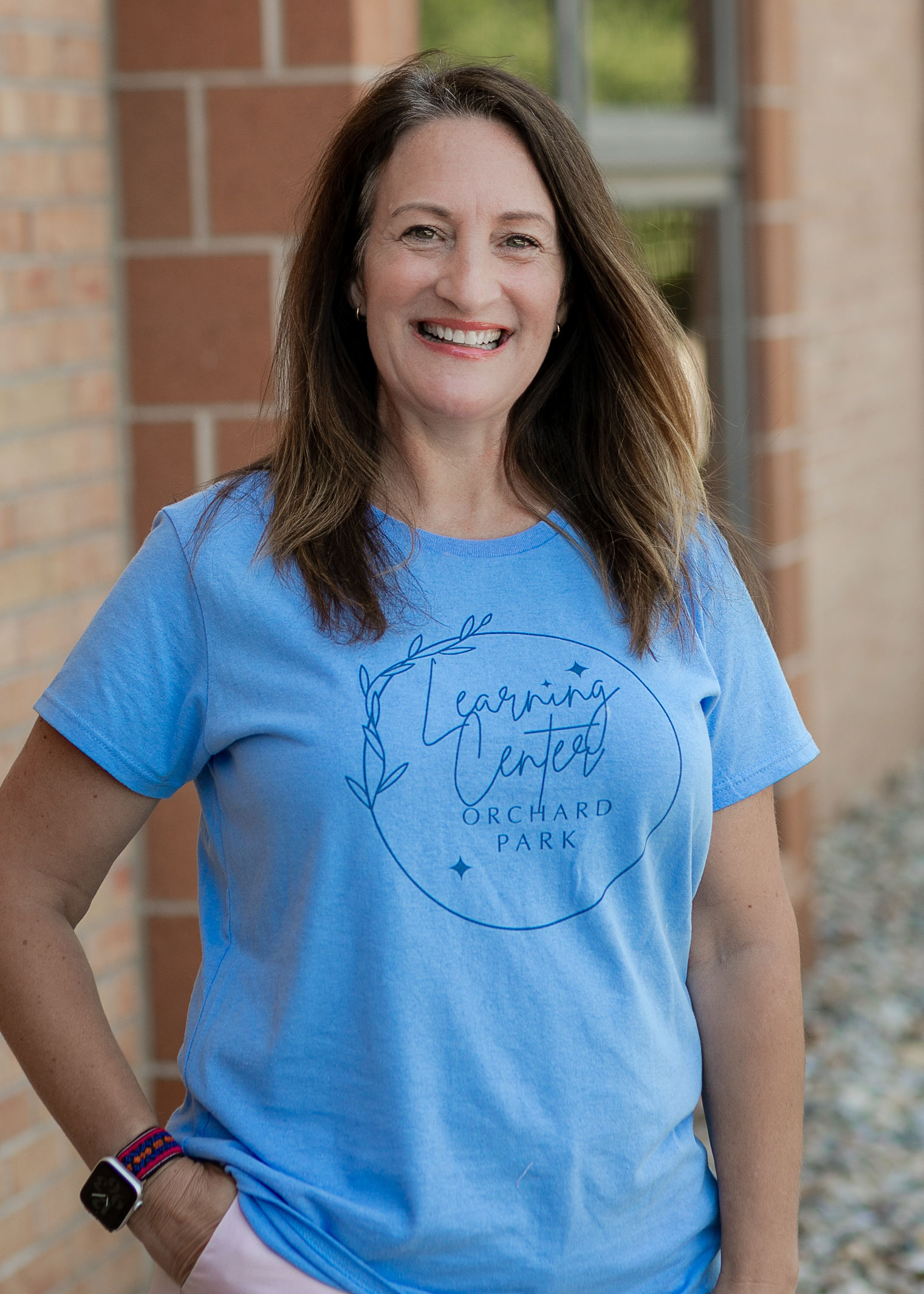
Lisa Thompson



